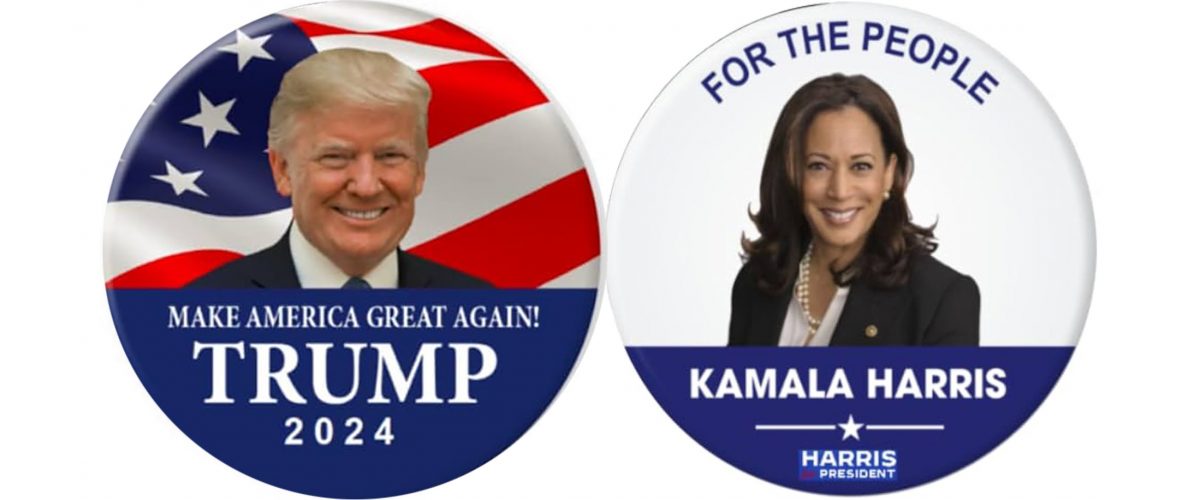After a tumultuous and fascinating two months in American politics, here are some things I see as this election year moves into its final stretch.
After the June presidential debate, Joe Biden’s candidacy was doomed. He was right to drop out.
There was no unseeing the feebleness we all saw. Afterward, the polls were showing Biden losing support seemingly by the hour. To its credit, the American public already was expressing concerns about Biden’s age before the debate; the doubts became insuperable afterward.

David Gushee
It is very worrisome that the president’s fading vitality had been hidden by his staff as far as possible before the debate made that impossible. Biden’s situation reminds me of other presidents — Woodrow Wilson, FDR, JFK — whose health challenges were downplayed or hidden from the public. The people deserve better information from their government.
It is a good thing for our country that President Biden finally stood down. Clearly, he did not do so voluntarily. The pressure was fierce. He was operating under an illusion as to his continued effectiveness.
It is a bracing lesson: Don’t hang on too long. You might think you are indispensable. But no one is indispensable.
Kamala Harris has had an astonishingly successful rollout.
Harris’ failed 2020 presidential run and the early reports from her vice presidency were not auspicious. But from the moment she knew Biden was standing down, she moved into effective action.
The way she locked down the nomination within 24 hours was a masterclass in consolidating power.
Overall, Harris’ performance since July 21 has been like that of a Broadway understudy who has grown into a top-tier talent, but no one knows it yet. It is only when she gets a chance to take the lead role that everyone discovers who she has become.
Another way to look at it is that after July 21 she simply had to rise to the challenge in the moment, sink or swim — and she did rise to the challenge. She has moved the polls from Biden -3 to Harris +4 as of this week.
One major problem Harris faces is running both as the sitting vice president and as the candidate of change. But she is managing it so far.
It ought to be possible for the Republicans to pin on Harris everything that can be critiqued about the policies of the Biden-Harris administration: the chaotic Afghanistan pullout, border control, inflation, housing. They are making every effort to do so. But so far, the shock of everything that is different about the vice president seems to outweigh the fact that she is the sitting VP.
At the Democratic National Convention, I saw two key issues where Harris’ substantive position is not visibly different from Biden’s stance, but she managed to distinguish herself on both: abortion and Israel/Gaza/Palestine.
On abortion, where Biden never was comfortable articulating the pro-choice case, Harris does so with confidence, including at the convention. It is not just that she is able to say with authority, as a woman, “Trust women.” She also argues that the overturning of Roe v. Wade in 2022 and the passage of highly restrictive legislation by several states legislatures marks a dramatic loss of basic personal liberty for women, increases risks for women’s health, reduces access to needed health care (in some cases creating life-threatening emergencies) and in some states forces girls and women to carry to term pregnancies that are the result of sexual assault. Biden never made such arguments.
“Harris makes the case on this issue very well. She will hammer the GOP with it all fall.”
She also could have said that so far the number of abortions in the U.S. has increased rather than decreased since Dobbs. And that voters in both red and blue states are consistently rejecting highly restrictive abortion laws when they are given a vote (six states so far, with 10 more states considering such measures in November). Harris makes the case on this issue very well. She will hammer the GOP with it all fall.
On Israel/Gaza/Palestine, the Biden-Harris administration has been under pressure from many grassroots supporters to offer more effective pressure for a ceasefire and return of hostages and to more effectively work against the morally indefensible Netanyahu government policies in Gaza (and, for that matter, in the West Bank).
In Gaza, Israel’s military continues to pummel the civilian population, with no discernible strategic objective. In terms of Just War Theory, it is hard not to conclude that Israel is violating the two core principles of proportionality and of discrimination between civilian and military targets. More than 40,000 are dead, mostly civilians, the physical landscape and most of the infrastructure and institutions of Gaza have been destroyed, and Gaza faces a humanitarian emergency.
Discontent over this issue threatened to disrupt the Democratic convention. Police and organizers kept the protests at bay, but the Democrats have had both a political problem with their own base and an appropriately uneasy conscience.
In her notable treatment of these issues at the convention, Harris began by condemning, in detail, the atrocious Oct. 7 Hamas attack on Israel and supporting Israel’s security and the U.S. commitment to that security. But she also articulated — and seemed to feel — genuine anguish over the “heartbreaking” suffering of the people of Gaza, stating her commitment to the Palestinian right “to dignity, security, freedom and self-determination.”
Harris did not break new substantive ground, perhaps, but her finely tuned, highly balanced statement, and its emotional tone, was just right. At least implicitly, Harris signaled that change is coming if she is elected.
Donald Trump, having swallowed up the Republican Party, seems to have little idea how to run against his new opponent.
The former president is no longer the younger, more vital candidate than his Democratic opponent. His personal insults and wild accusations are not helping him make his case. Slowly but surely the polls are turning in the Democrats’ direction.
The Republicans had every chance to pick a different candidate, one not saddled with Trump’s extraordinary baggage. But they did not, because Trump dominates what is left of that party.
“Trump has turned his party into a hollow personalist husk.”
One could not help but notice the distinction between a GOP convention where no former presidents, vice presidents or defeated candidates were present (no Bushes, no Cheneys, no Quayle, Palin, Romney, Ryan or Pence), over against the continuity displayed at the DNC, where pretty much the whole panoply of former leaders was present.
Trump has turned his party into a hollow personalist husk. It is hard to imagine what the rebuilding will look like after he is gone.
The vice presidential candidates seem unusually significant in 2024.
JD Vance has been wounded by effective opposition research that rapidly defined him through some of his more incendiary interview comments from the past. Democratic VP nominee Tim Walz seems to be striking a real chord among a generation of young people who have lost their fathers, one way or another.
Authoritarian reactionary Christianity is clearly going to keep the conservative Christian sector with Trump.
Trump still has a hold on rightwing Christians. Such Christians do not have a national majority, although certainly in numerous regions and states they do dominate. That is a big part of the whole phenomenon — this is a national minority that to itself feels like a majority. (I once lived in small-town West Tennessee. I know.)
So possibly, once again, tens of millions of Americans who dominate in two dozen states will believe — once again — that their president is the one that the official Electoral College count will declare to have lost. It will be easy for Trump to persuade some of them that this could only have happened through fraud — unless a Democratic victory is overwhelming.
As a Christian ethicist, I believe the most significant issue in the election continues to be the defense of democratic norms.
“No specific policy issue contested within a democracy is as important as whether the democracy itself survives.”
These norms include respect for free and fair elections, the rejection of political violence, and the peaceful transfer of power. No specific policy issue contested within a democracy is as important as whether the democracy itself survives. Making that case for democracy is what is occupying my time this fall.
But there also is reason to worry over much evidence of a turning of the penultimate realm of politics into a realm of ultimate meaning.
Politics has become our religion while religious commitment is fading. Amid the polarization of our politics, many people of faith appear to have made politics ultimate and faith subordinate or even indistinguishable from politics.
Jesus came preaching the kingdom of God. No country is that kingdom. No human community deserves ultimate loyalty.
One reason I hope our politics settles down before too long is so that it can recede into its proper place in our loyalties once again.
David P. Gushee is a leading Christian ethicist. serves as distinguished university professor of Christian Ethics at Mercer University, chair of Christian social ethics at Vrije Universiteit Amsterdam, and senior research fellow at International Baptist Theological Study Centre. He is a past president of both the American Academy of Religion and the Society of Christian Ethics. His latest book is Introducing Christian Ethics. He’s also the author of Kingdom Ethics, After Evangelicalism, and Changing Our Mind: The Landmark Call for Inclusion of LGBTQ Christians. He and his wife, Jeanie, live in Atlanta. Learn more: davidpgushee.com or Facebook.
Related articles:
The dark shadows over July 4 | Opinion by David Gushee
Don’t believe Trump’s claims he will be ‘great for women and their reproductive rights’ | Analysis by Rodney Kennedy
Vance is the most unpopular VP pick of the modern era


